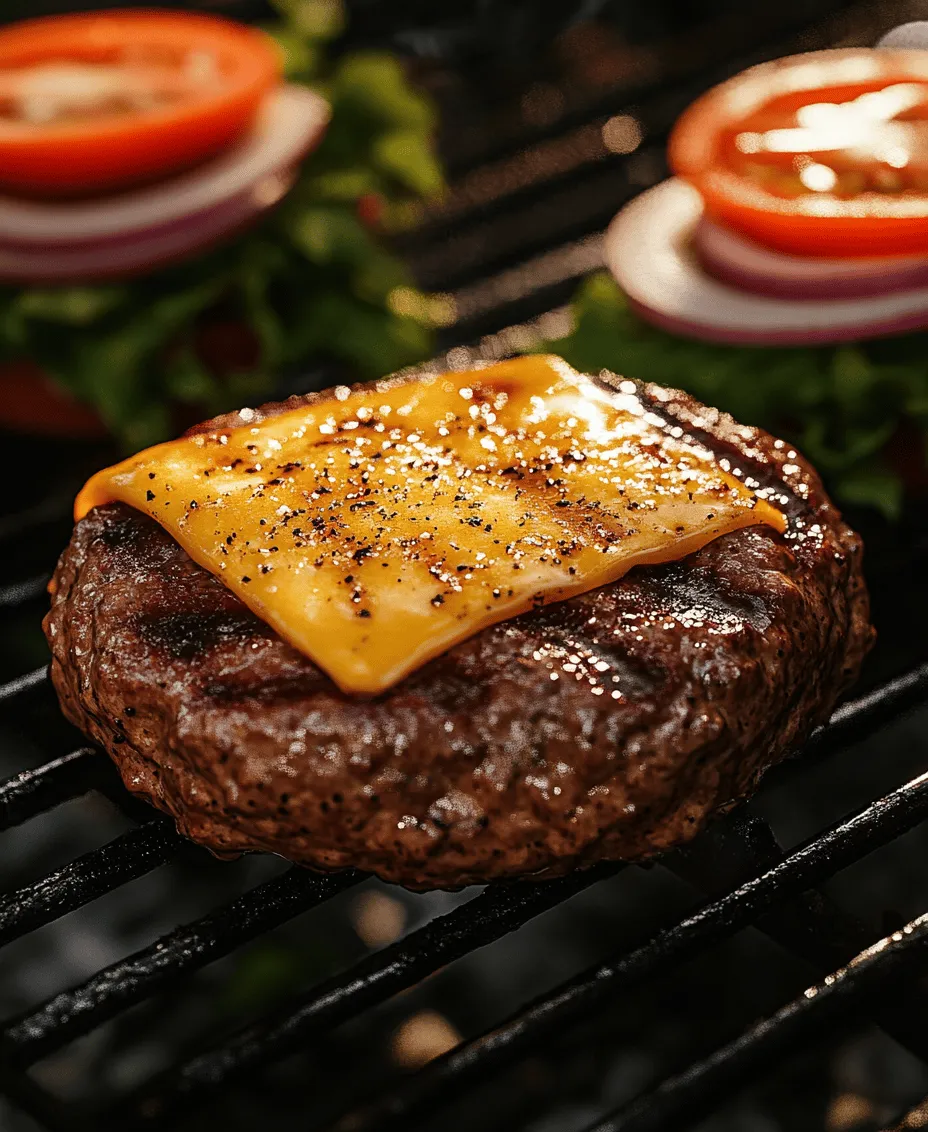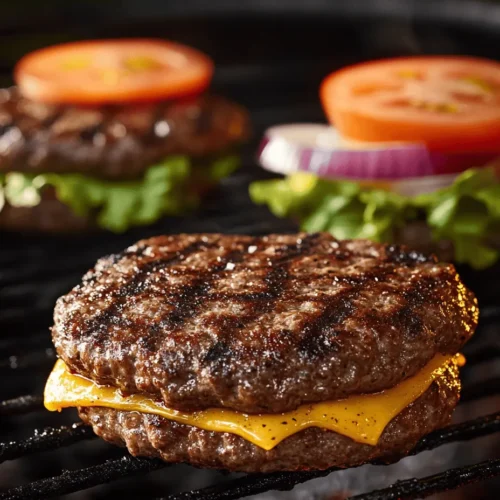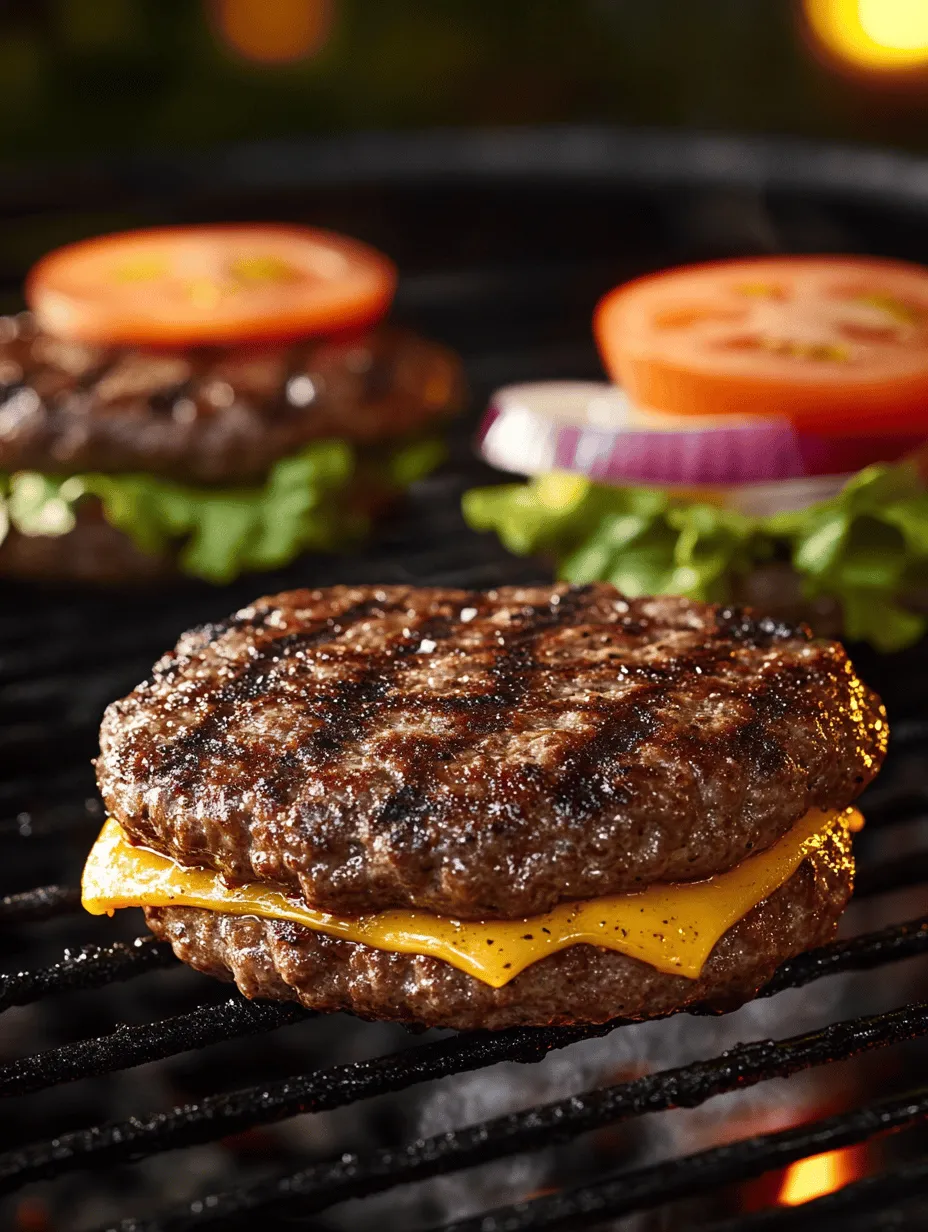Introduction
Welcome to “Delicious Hamburger Meat Creations: A Culinary Coloring Adventure,” where cooking meets creativity! In this article, we will explore the versatile world of hamburger meat through a series of mouthwatering recipes while infusing a sense of fun and artistry into the cooking process. This guide is not just about preparing delicious meals; it’s an invitation to engage with your food in a new way. Whether you’re a busy parent, a culinary novice, or an experienced home chef, these easy-to-follow recipes will simplify your mealtime and inspire you to unleash your inner artist in the kitchen.
Hamburger meat is a staple in many households for good reason. Its adaptability allows you to create a wide range of dishes, from classic hamburgers and hearty meatloaf to flavorful tacos and savory casseroles. In this article, we will start with the quintessential American hamburger, a dish beloved for its simplicity and endless customization options. The following sections will provide you with not only the recipe but also insights into the cultural significance of the hamburger, the nutritional benefits of ground beef, and tips for making your cooking experience enjoyable and stress-free.
Understanding Hamburger Meat
Before we dive into crafting the perfect classic hamburger, let’s take a moment to understand the star ingredient: hamburger meat. Ground beef comes from various cuts of beef, each offering distinct flavors and textures that can elevate your dishes. The most common cuts used for ground beef include chuck, sirloin, and round. Chuck is known for its rich flavor and ideal fat content, making it a popular choice for burgers. Sirloin offers a leaner option with robust taste, while round provides a more economical alternative with lower fat content.
Nutritional Benefits of Ground Beef
In addition to its culinary versatility, ground beef is packed with nutritional benefits. It is an excellent source of high-quality protein, which is essential for muscle growth and repair. A 3-ounce serving of cooked ground beef can provide approximately 22 grams of protein, making it a satisfying option for those looking to maintain a healthy diet. Ground beef is also rich in essential vitamins and minerals, including iron, zinc, and B vitamins. These nutrients play a vital role in energy production, immune function, and overall health.
When incorporating ground beef into your meals, it’s important to choose high-quality meat. Look for beef that is bright red in color, with minimal browning or discoloration. Additionally, consider opting for grass-fed or organic options for potentially higher nutrient content and better flavor. Proper storage is equally crucial; keep ground beef refrigerated and use it within one to two days of purchase, or freeze it for later use. When freezing, be sure to wrap it tightly in plastic wrap or aluminum foil to prevent freezer burn.
Classic Hamburger: The All-American Favorite
Ingredients and Preparation Overview
Now that we have a solid understanding of hamburger meat, let’s dive into the recipe for the classic hamburger. This dish is more than just a meal; it’s an iconic part of American culture. A well-made hamburger can be a celebration of flavors and textures, from the juicy patty to the fresh toppings. Here’s what you’ll need to create a delicious classic hamburger:
Ingredients
– 1 pound ground beef (80/20 blend for optimal flavor and juiciness)
– 1 teaspoon salt
– 1/2 teaspoon black pepper
– 1 teaspoon garlic powder (optional)
– 1 teaspoon onion powder (optional)
– 4 hamburger buns (preferably sesame seed or brioche)
– Toppings: lettuce, tomato, onion, pickles, cheese, and condiments (ketchup, mustard, mayonnaise)
Step-by-Step Cooking Instructions
Step 1: Prepare the Patties
Start by placing the ground beef in a large mixing bowl. To ensure your patties are flavorful, season the beef with salt, black pepper, garlic powder, and onion powder (if using). Gently mix the seasonings into the meat, being careful not to overwork it, as this can lead to tough patties. Divide the mixture into four equal portions, then shape each portion into a patty about ¾ inch thick. Make a slight indentation in the center of each patty using your thumb; this helps the burgers cook evenly and prevents them from puffing up on the grill.
Step 2: Preheat the Grill
Preheat your grill to medium-high heat. If you’re using a charcoal grill, let the coals burn until they’re covered with white ash. For a gas grill, simply turn on the burners and allow it to heat for about 10-15 minutes. The ideal cooking temperature for burgers is around 375°F to 400°F.
Step 3: Grill the Patties
Once the grill is hot, lightly oil the grates to prevent sticking. Carefully place the patties on the grill and cook for about 4-5 minutes on one side without moving them. This will help achieve a nice sear. Flip the patties using a spatula and continue grilling for an additional 3-4 minutes for medium doneness. If you’re adding cheese, place a slice on each patty during the last minute of cooking, closing the grill lid to melt the cheese.
Step 4: Toast the Buns
While the patties are grilling, toast the hamburger buns. Place them cut-side down on the grill for about 1-2 minutes until they are golden brown and slightly crispy. This step adds texture and prevents the buns from becoming soggy when loaded with toppings.
Suggestions for Creative Toppings and Variations
Now that your patties and buns are ready, it’s time to build your masterpiece! The beauty of hamburgers lies in their versatility. Here are some delicious topping ideas to enhance your classic burger experience:
– Lettuce and Tomato: Fresh, crisp lettuce and juicy tomato slices are foundational toppings that add freshness.
– Onion: Choose from raw red onions for a sharp bite, grilled onions for sweetness, or caramelized onions for a rich flavor.
– Pickles: Dill pickles add a delightful crunch and tang, while bread-and-butter pickles provide sweetness.
– Cheese: Experiment with different cheeses, such as cheddar, Swiss, or blue cheese, to elevate the flavor profile.
– Condiments: Classic ketchup and mustard are always popular, but consider adding barbecue sauce, sriracha, or even homemade aioli for a gourmet touch.
The Cultural Significance of the Hamburger
The hamburger is more than just a meal; it represents a significant part of American culinary history. Its origins can be traced back to the late 19th century, with claims of invention from various regions, including Hamburg, Germany, and the United States. The hamburger gained widespread popularity during the rise of fast food in the 20th century and has since become a symbol of casual dining.
In addition to its historical significance, the hamburger has become a canvas for culinary creativity, inspiring chefs and home cooks alike to experiment with flavors and presentations. From gourmet burgers topped with foie gras to plant-based alternatives, the hamburger continues to evolve, reflecting the diverse tastes and preferences of modern diners.
As we continue this culinary adventure, we will explore more exciting recipes featuring hamburger meat, including flavorful beef tacos that celebrate the cultural influence of Mexican cuisine. Stay tuned for delicious ideas that will inspire your next meal!

Hamburger meat is a versatile ingredient that serves as the foundation for countless meals across various cuisines. In this section, we’ll dive into three delightful dishes that showcase the adaptability of ground beef: meatballs, stuffed peppers, and Hamburger Helper. Each recipe not only highlights the rich flavors of hamburger meat but also offers a canvas for creativity in your cooking endeavors. Let’s explore how to prepare these comforting meals step by step.
Meatballs: A Comfort Food Classic
Ingredients and Preparation Overview
To make delectable meatballs that are juicy and flavorful, you’ll need the following ingredients:
– 1 pound of ground beef (preferably 80/20 for optimal fat content)
– 1/2 cup breadcrumbs (Italian seasoned for extra flavor)
– 1/4 cup grated Parmesan cheese
– 1/4 cup chopped parsley (fresh)
– 1/4 cup milk
– 1 large egg
– 2 cloves garlic, minced
– Salt and pepper, to taste
– Optional: 1 teaspoon Italian seasoning or red pepper flakes for added spice
These ingredients combine to create meatballs that are tender on the inside while having a delightful crust on the outside.
Instructions for Mixing and Baking Meatballs
1. Preheat the Oven: Start by preheating your oven to 400°F (200°C). This high temperature helps create a beautiful crust on your meatballs.
2. Mix Ingredients: In a large mixing bowl, combine the ground beef, breadcrumbs, Parmesan cheese, chopped parsley, milk, egg, minced garlic, salt, and pepper. If you’re using Italian seasoning or red pepper flakes, add them now.
3. Form Meatballs: Using clean hands, mix the ingredients until just combined; be careful not to overmix, as this can lead to dense meatballs. Scoop out portions of the mixture and roll them into balls about 1 to 1.5 inches in diameter.
4. Bake Meatballs: Place the formed meatballs on a baking sheet lined with parchment paper or lightly greased. Bake them in the preheated oven for about 20-25 minutes or until they reach an internal temperature of 160°F (70°C).
5. Serving Tips: Once baked, you can serve your meatballs in various ways. Toss them in marinara sauce for a classic spaghetti and meatballs dish, place them on a sub roll with melted cheese for a meatball sandwich, or serve them as appetizers with toothpicks and a dipping sauce.
Cooking Tips for Optimal Texture
– Fat Content: Choose ground beef with a good fat ratio (80/20) to ensure moisture and flavor.
– Chill the Mixture: If you have time, refrigerate the meatball mixture for about 30 minutes before forming them. This helps to firm up the mixture and makes it easier to shape.
– Don’t Overmix: Mix just until combined to maintain a tender texture.
A Brief History of Meatballs in Different Cuisines
Meatballs have a rich history and can be found in various forms across the globe. From the Italian polpette to Swedish köttbullar, these savory morsels have evolved to reflect the local ingredients and culinary traditions of each culture. In ancient Rome, meatballs were made with a mixture of meats and grains, often served with sauces. In the Middle Ages, meatballs became a way to stretch meat further, incorporating rice or bread to create filling meals. Today, they continue to adapt, with vegetarian and vegan versions emerging to cater to a wider audience.
Stuffed Peppers: A Colorful and Nutritious Dish
Ingredients and Preparation Overview
Stuffed peppers are not only visually appealing but also a great way to incorporate more vegetables into your diet. Here’s what you’ll need:
– 4 large bell peppers (any color)
– 1 pound ground beef
– 1 cup cooked rice (white or brown)
– 1 can (15 oz) diced tomatoes (drained)
– 1 small onion, finely chopped
– 2 cloves garlic, minced
– 1 teaspoon cumin
– 1 teaspoon paprika
– Salt and pepper, to taste
– 1 cup shredded cheese (cheddar or mozzarella)
– Fresh herbs for garnish (optional)
Step-by-Step Instructions for Preparing and Baking Stuffed Peppers
1. Preheat the Oven: Begin by preheating your oven to 375°F (190°C).
2. Prepare the Peppers: Slice the tops off the bell peppers and remove the seeds and membranes. Lightly brush the outside with olive oil and place them in a baking dish.
3. Cook the Filling: In a skillet over medium heat, sauté the chopped onion and minced garlic until the onion becomes translucent. Add the ground beef, cooking until browned. Drain any excess fat.
4. Mix the Filling: In a large bowl, combine the cooked beef mixture with cooked rice, diced tomatoes, cumin, paprika, salt, and pepper. Mix until well incorporated.
5. Stuff the Peppers: Spoon the filling into each bell pepper, packing it down slightly. Top with shredded cheese.
6. Bake the Peppers: Cover the baking dish with aluminum foil and bake for 25 minutes. Remove the foil and bake for an additional 10-15 minutes or until the peppers are tender and the cheese is melted and bubbly.
Discussing Variations
Stuffed peppers are incredibly versatile. You can easily switch up the proteins, using ground turkey or chicken for a lighter option. For a vegetarian version, substitute the meat with black beans, lentils, or quinoa, and consider adding more vegetables like zucchini or corn. Experiment with different grains, such as farro or bulgur, to enhance texture and nutrition.
Highlight the Visual Appeal and Ideas for Presentation
When it comes to presentation, stuffed peppers are a feast for the eyes. Use a colorful variety of bell peppers to create a vibrant dish. Consider garnishing with fresh herbs or a drizzle of balsamic reduction for an elegant touch. Serve them on a rustic wooden platter or a vibrant ceramic dish to enhance their visual appeal.
Hamburger Helper: Quick and Satisfying
Ingredients and Preparation Overview
Hamburger Helper is the epitome of a quick and satisfying meal, perfect for busy weeknights. Here’s what you will need:
– 1 pound ground beef
– 2 cups elbow macaroni
– 1 can (15 oz) diced tomatoes with green chilies
– 2 cups beef broth
– 1 cup shredded cheese (cheddar or your choice)
– 1 teaspoon onion powder
– 1 teaspoon garlic powder
– Salt and pepper, to taste
– Optional: 1 cup frozen mixed vegetables (peas, carrots, corn)
Instructions for Cooking the Dish
1. Brown the Beef: In a large skillet, brown the ground beef over medium-high heat. Drain excess fat.
2. Add Ingredients: Stir in the diced tomatoes, beef broth, elbow macaroni, onion powder, garlic powder, salt, and pepper. If using frozen vegetables, add them at this stage.
3. Simmer: Bring the mixture to a boil, then reduce the heat to low. Cover and let it simmer for about 10-15 minutes, or until the macaroni is cooked al dente.
4. Add Cheese: Once the pasta is cooked, remove from heat and stir in the shredded cheese until melted and creamy.
Discussing the Benefits of Adding Vegetables
Adding vegetables to your Hamburger Helper not only enhances its nutritional value but also adds flavor and texture. Frozen mixed vegetables are an easy way to incorporate nutrition without much prep time. You can also toss in fresh spinach, kale, or bell peppers for a boost of vitamins and minerals.
The Nostalgic Origins of Hamburger Helper
Originally introduced in the 1970s, Hamburger Helper was designed to help families stretch their grocery budgets during tough economic times. It became a staple in many households, known for its convenience and ease of preparation. Over the years, it has evolved into various flavors and styles, adapting to modern tastes while maintaining its core appeal as a quick, hearty meal.
Conclusion
The versatility of hamburger meat shines through in these three delightful recipes: meatballs, stuffed peppers, and Hamburger Helper. Each dish tells a story of comfort, creativity, and culinary exploration. Cooking with ground beef allows you to whip up meals that are not only satisfying but also full of flavor and nutrition.
As you embark on your culinary journey, remember that cooking is as much about joy and creativity as it is about nourishment. These recipes invite you to experiment, personalize, and enjoy the process. Gather your family and friends around the table, share your creations, and relish the memories made in the kitchen. Whether you’re reliving childhood nostalgia with Hamburger Helper or crafting beautifully stuffed peppers, the joy of cooking brings us all together. Embrace the experience, and let the flavors inspire your next culinary adventure.


